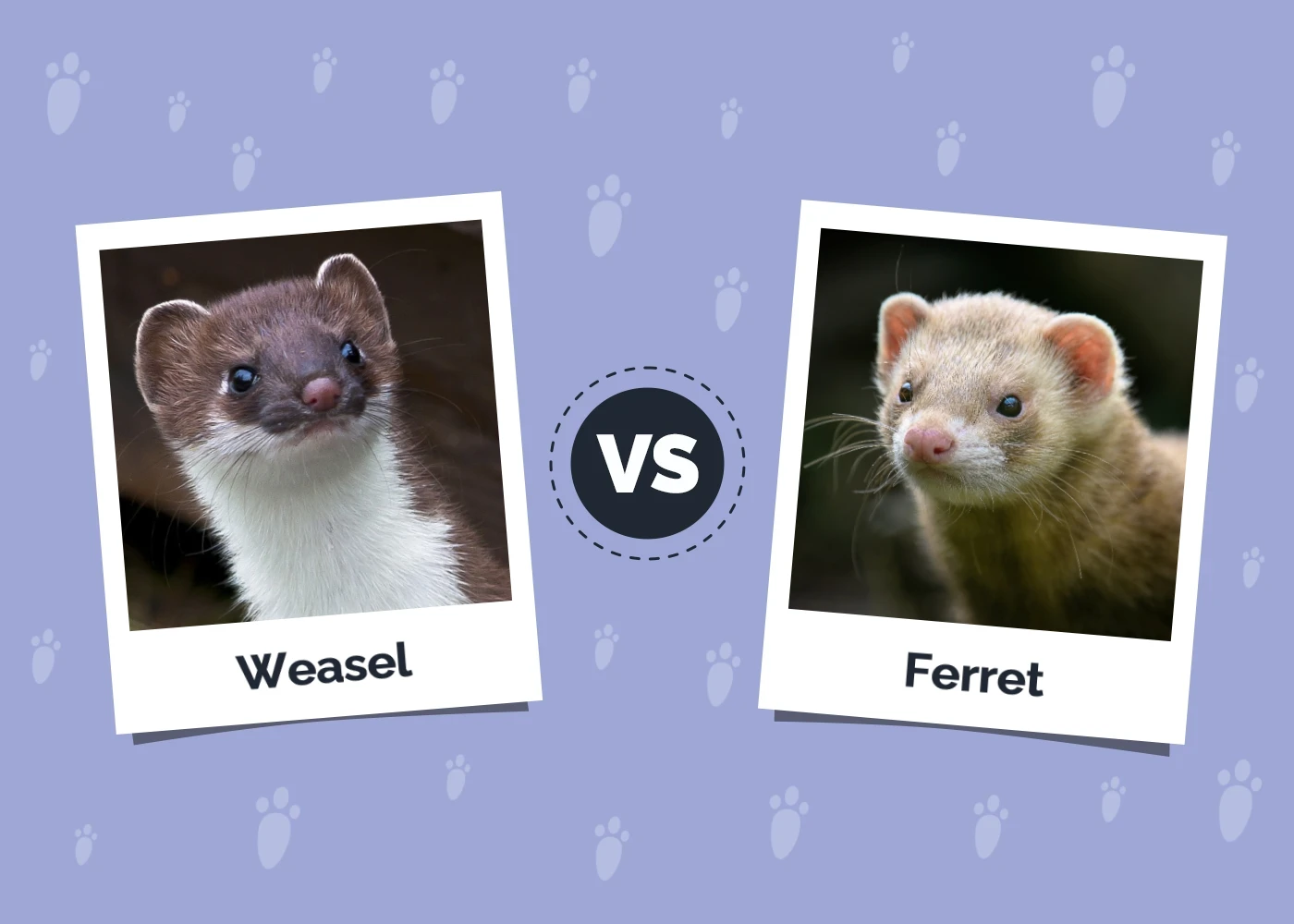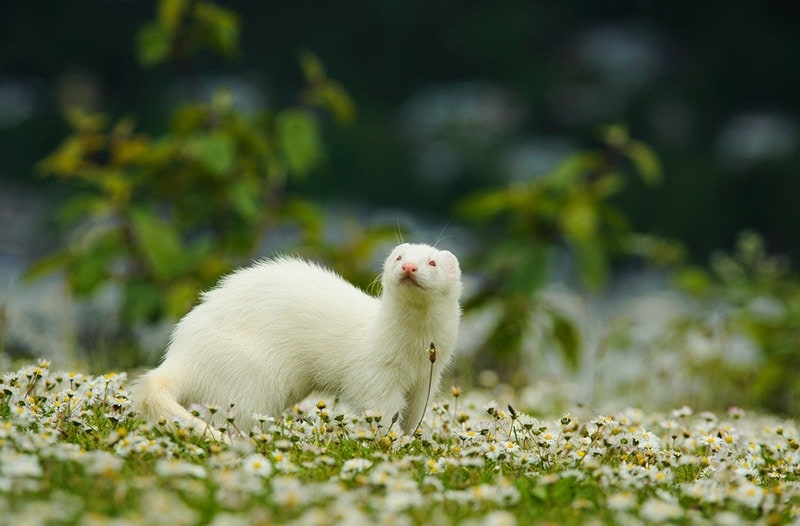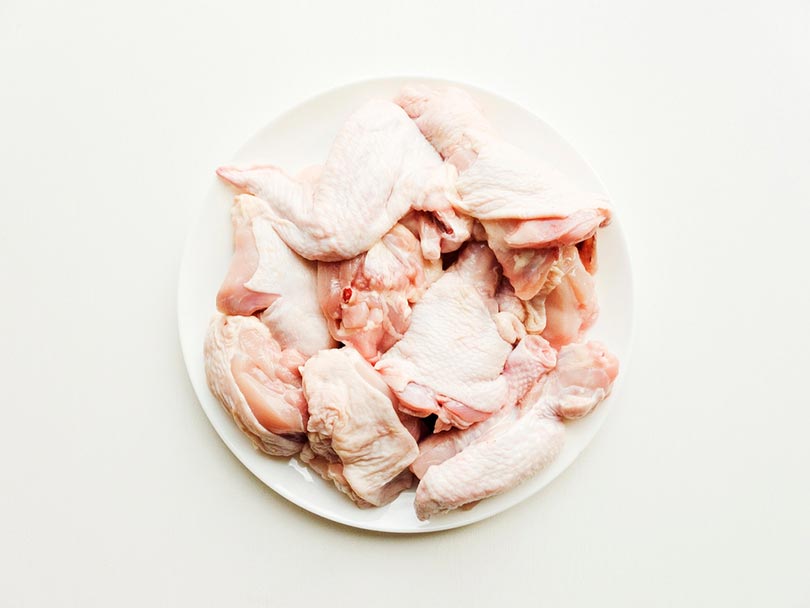Are Ferrets Carnivores? Vet Approved Nutrition Facts

Updated on
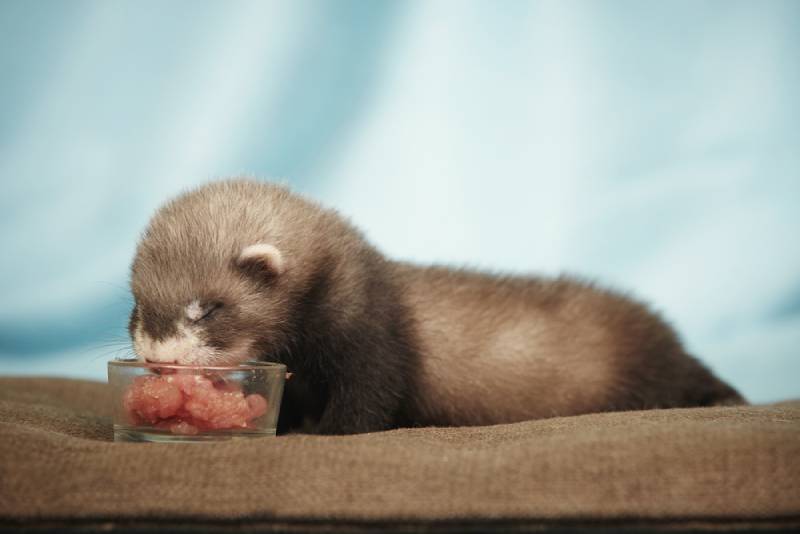
Ferrets are similar to cats in the sense that they are obligate carnivores. They require a diet high in animal-derived protein and fat, without large quantities of carbohydrates and fiber. In this article, we’ll look at precisely what ferrets need from their diets. So, whether you’re here because you’re thinking of getting one or just curious, you’ll leave today knowing a little more about what goes into keeping a ferret happy and healthy.

A Little Bit About the Ferret
Like weasels, polecats, otters, badgers, and minks, ferrets are part of the Mustelidae family1. As adults, they weigh 1½ to 5 pounds and live around 6 to 10 years. They are most active early in the morning and evening but also sleep about 75% of the day.
Males are known as “hobs,” while females are “jills,” and babies are “kits.” A group of ferrets is called a “business,” and they are known for being playful, intelligent, and friendly. They love attention and being around people and are so intelligent that you can train them to perform tricks! They should be supervised at all times outside their cage and kept away from other pets like guinea pigs, rabbits, gerbils, hamsters, and reptiles, as they might see them as prey-items.
Ferrets are predators and were first domesticated because of their predatory nature; they hunted rats, mice, and rabbits that were attacking crops. However, they are also considered to be prey because their small size makes them a target for birds of prey, coyotes, foxes and snakes.
What Do Ferrets Eat in the Wild?
A wild ferret’s diet is a carnivorous one made up of small prey. They are excellent hunters and opportunistic predators. Examples of the animals they eat in the wild include:
- Birds
- Ground squirrels
- Hedgehogs
- Mice
- Rats
- Rabbits
- Shrews
- Snakes
- Voles
Wild ferrets generally consume all of their food, from the fur and feathers to the bones and internal organs. Their thin, small, and long bodies allow them to follow animals into their holes, and they kill their prey quickly.

What Should You Feed Your Pet Ferret?
One of the biggest issues new ferret owners face is getting to grips with the feeding schedule of a ferret. They have high metabolisms and need to eat almost constantly, and domesticating them has done nothing to change this.
You might stumble on articles recommending an omnivorous diet, which includes fruit and carbohydrates, but that is incorrect and outdated information. Carbohydrates can harm a ferret because their digestive system can’t break them down well.
Commercial Diets
The main part of your ferret’s everyday diet should be made up of high-quality, commercial ferret food. It’s available in your local pet store and is an excellent option because it doesn’t go stale as quickly as fresh food, and you can be sure that it is nutritionally balanced and appropriate for your ferret. The animal protein should be between 35% and 40% and the first three ingredients on the food package should be meat-derived.
Animal fat should be between 20%-30% (growing kits need the top end of this range), and it’s an incredibly important ingredient that provides your ferret with energy. Carbohydrates should be less than 25%; ferrets do not need any dietary carbohydrate. Lastly, avoid diets that offer too much fiber in the form of vegetables, plants, and fruits as a ferret’s gut just cannot digest it. The best ferret kibble is grain-free, and the fiber percentage won’t exceed 3%.
Bones
Your ferret can eat bones, but they shouldn’t make up more than 10% of their diet, and they shouldn’t be cooked, as they can splinter and injure them. Bones will help satisfy their need to chew on something and also have the added bonus of keeping their teeth clean.
Meaty bones should always be large enough that your ferret can’t fit the whole bone in their mouth. Also, check with your veterinarian if bones are a suitable option before giving them to your ferret. For example, they might have difficulty chewing on a raw bone if they have dental disease.
Fresh Meat
Ferrets can eat raw food, and it mimics how they would eat in the wild, but it is best and more balanced to provide the whole carcass so that the ferret eats the offal, skin and the meat. Just muscle meat e.g. a chicken breast is not a balanced meal as they are high in phosphorus and deficient in calcium. A better treat choice is the occasional whole-prey item such as a mouse, rat or chick, even if the remainder of the diet is kibble.
A raw diet requires extra work, organization and planning, so we recommend a commercial ferret diet as the mainstay of your pet’s intake, alongside the occasional whole carcass to add interest and encourage their natural behavior.
Additionally, ferrets need a constant source of water to keep them hydrated. Ferrets prefer a water bowl to a water bottle, so a heavy-based water bowl that your ferret can’t tip up is a good choice. Keep your water bowl away from your ferret’s toileting area because sometimes they might use the water bowl as a toilet instead.
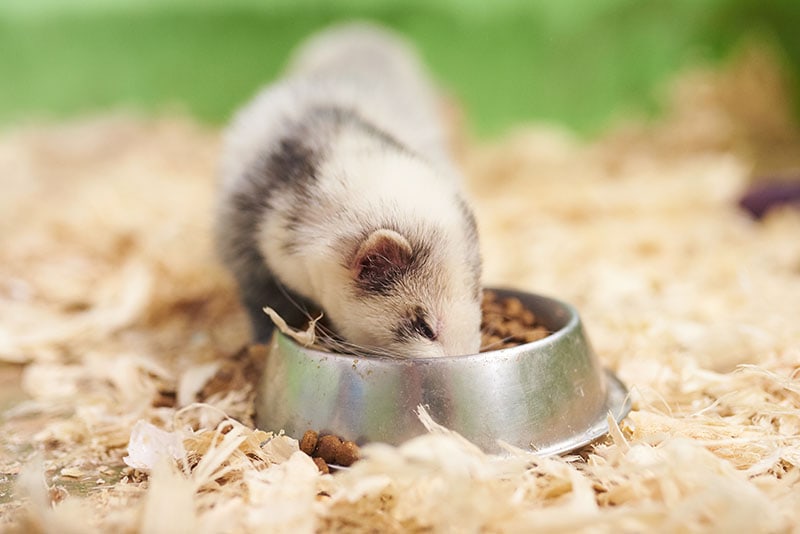
Can Ferrets Get Salmonella From a Raw Diet?
Salmonella is a risk resulting from consuming raw meat, which is another reason some owners primarily opt for a commercial diet. Although it’s rare in ferrets, they can get salmonella.
- Rapid weight loss
- Dehydration
- Anemia
- Conjunctivitis
- Diarrhea (generally with fresh blood or mucus present)
- Fever
- Inappetence
- Lethargy
Meat That Your Ferret Can’t Eat
Ferrets should eat their meat raw if they are going to eat fresh meat because cooking destroys some of the nutritional value. However, they can occasionally enjoy cooked meat as a treat if you keep it plain, so avoid using spices or seasoning.
Make sure you get all of your meat from a trusted retailer, and don’t try to catch rodents yourself or feed your ferret roadkill; they can contain bacteria and parasites.

Final Thoughts
Ferrets are obligate carnivores, so they should avoid fruits, plants, carbohydrates and too much fiber in their diet. Instead, they require their protein from animal sources, and in the wild, they hunt small animals like hedgehogs and voles.
If you have a ferret as a pet, they can eat fresh, raw whole body carcasses, but this will require more organization to ensure their meals meet all their nutritional needs. They can also enjoy protein-rich ferret formulated dry foods and require plenty of fresh water to keep them healthy. If you are unsure what to feed a new pet, contact your vet for advice.
Featured Image Credit: Couperfield, Shutterstock

